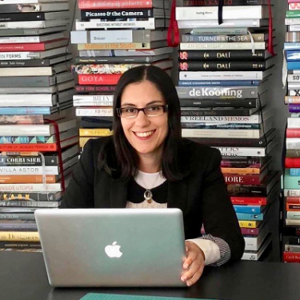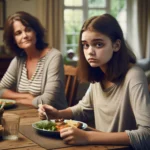Peeling the onion: Losing the layers of my eating disorder
Peeling the onion: Losing the layers of my eating disorder

by Sarah Cannata
It’s our secrets that keep us sick. This line has lingered with me uncomfortably for a long time. Every now and again, it forces its way to the top of my mind until I manage to mentally beat it down, usually by focusing on completing a meaningless task.
The cost of silence
I have never openly told people about my struggle with anorexia as a teenager and in my early years of adulthood. I have close friends who have no idea of my illness. In a way, that means most people don’t know about a huge piece of my past. My motto has been simple: unless there’s a confidentially clause at play (think doctors and other health professionals), that time of my life should remain in my vault, never to see the light of day. Why? I’ve spent much time since getting better contemplating this and, each time, I’m hit smack-bang in the face with the cold hard truth. Shame.
“Shame needs three things to grow exponentially in our lives: secrecy, silence and judgement.” Brené Brown
I’ve certainly ticked those boxes well in my life. I did not attend any kind of facility or clinic for treatment during my recovery. This is not an example I recommend for people struggling with eating disorders to follow. Such a path is lonely to walk and the fact that no one else really understood what I was going through, ate away at me. There were many dark moments.
If you are experiencing eating disorder symptoms, I recommend you seek access to trained medical professionals and reach out for the support from your family and friends – getting better often requires many sources.
The fork in the road
There are entire periods in my teenage years that I cannot remember, they’re blank in my mind because I was so unwell. Choosing not to speak about my past has been strategic in many ways. It’s been a struggle to shake the impact that such a revelation may have on the current life I’ve built for myself. Catastrophising has always come easy and the endless “what if?” scenarios that play out in my mind are sometimes crippling. I’m aware such dramatism may be “all in my mind.”
Speaking of my mind, here’s a glimpse into my mind as I hit the fork in the road that kick-started my recovery journey.
Thump. Thump. Thump.
Dead of the night. Eyes wide open, staring out into the darkness. ‘It’s’ finally here for me.
Thump. Thump. Thump.
If this isn’t the end, I’ll fight
Heart racing faster and faster… waiting for the knockout blow that ends it all. There’s a sense of relief in knowing the end is near. In knowing the pain and daily struggle is destined to end. Finality glistens temptingly and I can almost touch it. As I lay down in bed, eyes staring at the ceiling and chandelier that hangs daringly above my bed, with my last thoughts ahead of the darkness, I make a promise – not to myself because I was so far gone at that point that any promise to myself seemed pointless – a promise to the universe: if this isn’t the end, I’ll fight.
Then the darkness swallows me.
Much to my disappointment at the time, my eyes forced themselves open the next morning. I pushed myself to lift the top half of my body off the bed – the bruises on my back from bone hitting and rubbing up against hard surfaces like chairs were throbbing. As I sat on the edge of the bed, the room swirled around me and the realization hit me: I wasn’t dead.
Becoming part of the solution
I have kept the promise I made that evening, many years ago. So why am I telling my story now, despite all of the cons I’ve outlined? Well, up to now, my secrecy and silence hasn’t done anyone any good. I’ve been in rooms where former colleagues have spoken very nastily about someone in the office who they think has an eating disorder. And all I did was sit there in awkward silence, thinking about my past and pondering what people would think if they knew the truth about me. I’ve been in other rooms where people repeat back to me all of the clichés about why people fall down the eating disorder rabbit hole after watching a current affairs segment. I have listened to podcasts where anorexia is labelled as a ‘selfish’ illness. At this moment in my life, my secrecy and silence is no longer good enough for my harshest critic: me. It’s time for me to use my lived experience in a way that’s part of the solution.
Why not me?
I’d be lying if I said there were never times when I look back and feel an extreme level of bitterness towards my anorexia. This illness has changed the course of my life. Sometimes, I even miss the numbness of it – slowly dying is a way of shutting off your emotions. I wonder what I can achieve because of how this illness has shaped my life, and how the hard work of recovery (and coping with the unavoidable health consequences) has provided heightened self-awareness and clarity of what is truly important in life. I don’t really sweat the small stuff. Make-up, shoes, eyeliner, mascara, pretty things, they’re not all that important when I consider I may never have seen another sunrise once upon a time.
For many years, I asked myself ‘why me?’ In recent times, I’ve come to realize that I’ve been asking the wrong question all along. The questions I ask these days are, ‘why not me?’ and ‘how can I make my illness experience count in a way that helps others?’ Sharing my story here is my first step in coming out and making my illness experience count.
Links
Personal website: www.sarahcannata.com
Email: sarahcannata@gmail.com
This Woman Can: www.thiswomancan.org






[…] 21 January 2019, I wrote about my eating disorder publicly for the first time. I did so selectively – on a relatively safe forum and with the […]